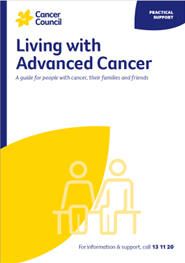- Home
- Cancer Information
- Advanced cancer
- Living with advanced cancer
- Key questions
- What can I expect in the future?
What can I expect in the future?
Not all people with cancer – even advanced cancer – will die from it. For some people, improved treatments can keep advanced cancer under control for months or years. Sometimes other health issues (such as heart disease) become more serious than the cancer.
When told they have advanced cancer, many people will want an idea of how long they may have left to live. Others may prefer not to know, or even talk about it. It’s a very personal decision. If you want to know the expected outcome (prognosis) of the cancer, talk to your doctor. It is a difficult question to answer because everyone is different. Your doctor can only give you an estimate based on what usually happens to people in your situation. The actual time that you have could be longer or shorter – it’s not possible to know for sure.
When faced with the thought of dying, people often think about what they want to do in the time they have left. They may begin to live day by day, plan a big trip or do practical tasks, such as preparing a will. For more on this, see Looking ahead.
For more on this, see Facing end of life, and listen to The Thing About Advanced Cancer podcast series.
The prognosis is based on statistics, and it’s entirely possible that you will be on the good side of those statistics, and make it way beyond whatever your oncologist tells you.
John
→ READ MORE: The emotional impact
More resources
Dr Lucy Gately, Medical Oncologist, Alfred Health and Walter and Eliza Institute for Medical Research, VIC; Dr Katherine Allsopp, Supportive and Palliative Care Specialist, Westmead Hospital, NSW; A/Prof Megan Best, The University of Notre Dame Australia and The University of Sydney, NSW; Dr Keiron Bradley, Palliative Care Consultant, Medical Director Palliative Care Program, Bethesda Health Care, WA; Craig Brewer, Consumer; Emeritus Professor Phyllis Butow, Psychologist, The University of Sydney and Chris O’Brien Lifehouse, NSW; Louise Durham, Palliative Care Nurse Practitioner Outpatients, Princess Alexandra Hospital, Metro South Palliative Care, QLD; Dr Roya Merie, Radiation Oncologist, ICON Cancer Centre, Concord, NSW; Penny Neller, Project Coordinator, National Palliative Care Projects, Australian Centre for Health Law Research, Queensland University of Technology, QLD; Caitriona Nienaber, 13 11 20 Consultant, Cancer Council WA; Xanthe Sansome, Program Director, Advance Care Planning Australia, VIC; Sparke Helmore Lawyers; Peter Spolc, Consumer.
View the Cancer Council NSW editorial policy.
View all publications or call 13 11 20 for free printed copies.
Need to talk?
Support services
Coping with cancer?
Speak to a health professional or to someone who has been there, or find a support group or forum
Looking for transport, accommodation or home help?
Practical advice and support during and after treatment
Cancer information
Dealing with the diagnosis
Common reactions to a cancer diagnosis and how to find hope
Explore our resource hub
Explore and download our booklets, fact sheets, podcasts, webinars and videos for people affected by cancer

